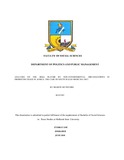Please use this identifier to cite or link to this item:
https://cris.library.msu.ac.zw//handle/11408/3678Full metadata record
| DC Field | Value | Language |
|---|---|---|
| dc.contributor.author | Mutepaire, Sharon | - |
| dc.date.accessioned | 2019-06-11T13:24:11Z | - |
| dc.date.available | 2019-06-11T13:24:11Z | - |
| dc.date.issued | 2018 | - |
| dc.identifier.uri | http://hdl.handle.net/11408/3678 | - |
| dc.description.abstract | The research analyzed the role played by non-governmental organizations in promoting peace, using the case of South Sudan. Since South Sudan got its independence from Sudan in July 9,2011, catastrophes in the world’s newest independent country have not ended, the people are still ravaged with inevitable conflicts and wars, due to multiple challenges and other push factors like poorly performing government, disjoint social cohesion, civil unrest and the psycho-social trauma generated by sexual violence and child exploitation. In South Sudan there are sixty-four tribes and with the biggest population been the Dinka followed by the Nuer, but can this be used to measure the instability of peace in the country in the way it has been presented and brought to much attention in documents, thus the research was not overshadowed by this view only, but rather it looked at the effectiveness of third players (NGOs) at a wide perspective zeroing in the negative and positive effects of the increase or collaboration of non-governmental organizations such as UNHCR, UNMISS, Norwegian Peoples Aid, Social and Human Development Consultative groups who are playing a role in promoting Peace and this was not undermined. On this regard the main role ideology of implementing peace in South Sudan efforts to readdress casualties that might continue to affect the future of the country, However despite the good intentions of bringing peace in South Sudan, the questions remain partially answered because of the failures of NGOs to locate or address areas which need immediate attention and the diversion of personal guided interests ,for instance the problem of the government SPLM/A visas SPLM/AIO( Sudan People’s Liberation Movement Army In opposition to the government which is SPLM/A) and service delivery to the people was pointed to be poor affecting the other spheres, the research noticed some players behind the seen supporting the opposition party at the same time hiding behind NGOs for example the UNSC singling out the interests of individual countries in the counsel . In a way, striking a balance between the role played by NGOs in promoting peace in South Sudan and the results seen, were done through a mixed approach, thus through the use of interviews, documentary reviews. Both non-probability and probability sampling technics were used on the research and thematic analysis of data presentation and analysis. Graphs and tables were used in the presentations of findings. | en_US |
| dc.language.iso | en | en_US |
| dc.publisher | Midlands State University | en_US |
| dc.subject | Peace | en_US |
| dc.subject | South Sudan | en_US |
| dc.subject | Independence | en_US |
| dc.title | Analysis on the role played by non-governmental organizations in promoting peace in Africa: the case of South Sudan from 2011-2017. | en_US |
| item.languageiso639-1 | en | - |
| item.grantfulltext | open | - |
| item.fulltext | With Fulltext | - |
| Appears in Collections: | Bachelor of Science Peace Studies Honours Degree | |
Files in This Item:
| File | Description | Size | Format | |
|---|---|---|---|---|
| turnitin shazzy final.pdf | Full Text | 1.34 MB | Adobe PDF |  View/Open |
Page view(s)
134
checked on Apr 11, 2025
Download(s)
170
checked on Apr 11, 2025
Google ScholarTM
Check
Items in MSUIR are protected by copyright, with all rights reserved, unless otherwise indicated.



